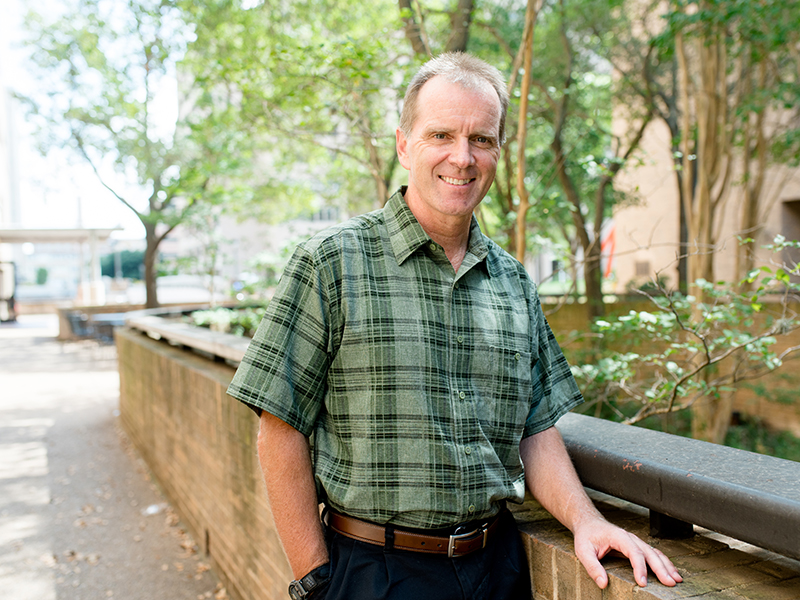Mechanical Engineer to Bicycle Across America for Organ Donation Awareness
Last fall, Mechanical Engineering Associate Professor Rick Neptune and his wife, Denise, rode their tandem bike for 12 hours straight in northern Texas for the fun of it, racking up 238 miles to win their division in the North American Ultra Cycling Championship. Rick Neptune now has a bigger cycling goal as he begins bicycling that many miles a week to train for a June race considered one of the world’s most challenging athletic events.

Rick Neptune, professor in Department of Mechanical Engineering
Instead of emphasizing the time clock in June, this expert on lower-limb disabilities will join seven team members to give others the gift of time. Each member of Team Donate Life-Grace Valley will take turns at 15-minute, solo sprints in the non-stop Race Across America that they’ll begin June 12 to raise funds and awareness about organ donations.
“On average, 17 people die each day waiting for an organ transplant,” said Neptune. “This race is a great opportunity to give somebody a second chance at life.”
Neptune and team members from the church he formerly attended in Davis, CA, hope to increase the number of Americans signed up to donate their organs to 40 million. The total number of patients awaiting organ transplants is more than 83,000, and more than one-third are expected to die before a donor is found. That tragedy also explains why the team’s fundraising will help find ways to prevent donated organs from being rejected when they aren’t a perfect match for a person.
“There’s a lot of ongoing research to improve the biocompatibility of tissues for transplants,” Neptune said.
He quickly noted that the best match for a diseased kidney or other organ is still another human organ. Neptune knows a lot about the mechanical side of tissue compatibility, since his own research involves helping people get the right prosthetic or other device to make the most of their lives after a lower limb injury.
To this end, he has done everything from using computer models to evaluate the movements of stroke patients on stationary bicycles, to designing orthotic devices that provide extra “pep” in the step for someone who has weak lower-limb muscles.
Neptune has been recognized for these efforts with honors such as a National Science Foundation CAREER award for romising young teachers/scholars, and a da Vinci Award from the Engineering Society of Detroit and the National Multiple Sclerosis Society for his work aiding those with lower-limb disabilities.
His commitment to cycling has also brought accolades, including winning the 1999 California Master Sprint State Championship. But Neptune admitted the 3,043-mile Race Across America will bring new challenges.
The nearly week-long race from Oceanside, Calif., to Atlantic City, N.J. will require climbing more than 10,000 feet to cross the Continental Divide, and more than 108,000 feet during the course of the race. That climb through cool Rocky Mountain air will come after traveling through warmer Arizona, a combination that has led to bronchitis for previous race participants.
The Grace Valley riders will sleep a few hours at a time in a recreational vehicle trailing behind the pack of five who will be bicycling at any given time during the continuous race. Once a sleep rotation is done, Neptune and the other riders will need to put the wheels to the pavement with enough speed and grace to adeptly switch turns in the lead position.
“It’s a nonstop event that will put all of our physical and mental skills to the test,” Neptune said. “Cycling through the night should be really interesting.”
Knowing his teammates very well from the years he spent in Davis while a graduate student helps, he added. Teammates also help keep each other motivated during the grueling training months by reporting in regularly. And Denise, his wife, participates in as many of his training rides as possible. She will track his team’s progress on-line from Austin along with that of the other five Team Donate Life teams.
Neptune noted that calling her to hear about their young family of four will be a highlight of the trip, as will the countryside unfolding before him during the race.
“Being able to see so many regions of the United States from a bicycle will be amazing,” Neptune said, “and knowing that we’ll be giving other people the chance to have more adventures of their own will make it all the more special.”
